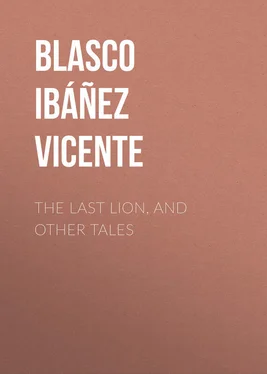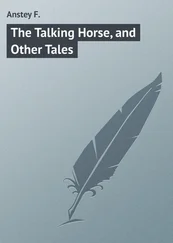Vicente Blasco Ibáñez - The Last Lion, and Other Tales
Здесь есть возможность читать онлайн «Vicente Blasco Ibáñez - The Last Lion, and Other Tales» — ознакомительный отрывок электронной книги совершенно бесплатно, а после прочтения отрывка купить полную версию. В некоторых случаях можно слушать аудио, скачать через торрент в формате fb2 и присутствует краткое содержание. ISBN: , Жанр: foreign_prose, foreign_antique, foreign_language, на английском языке. Описание произведения, (предисловие) а так же отзывы посетителей доступны на портале библиотеки ЛибКат.
- Название:The Last Lion, and Other Tales
- Автор:
- Жанр:
- Год:неизвестен
- ISBN:http://www.gutenberg.org/ebooks/39062
- Рейтинг книги:5 / 5. Голосов: 1
-
Избранное:Добавить в избранное
- Отзывы:
-
Ваша оценка:
- 100
- 1
- 2
- 3
- 4
- 5
The Last Lion, and Other Tales: краткое содержание, описание и аннотация
Предлагаем к чтению аннотацию, описание, краткое содержание или предисловие (зависит от того, что написал сам автор книги «The Last Lion, and Other Tales»). Если вы не нашли необходимую информацию о книге — напишите в комментариях, мы постараемся отыскать её.
The Last Lion, and Other Tales — читать онлайн ознакомительный отрывок
Ниже представлен текст книги, разбитый по страницам. Система сохранения места последней прочитанной страницы, позволяет с удобством читать онлайн бесплатно книгу «The Last Lion, and Other Tales», без необходимости каждый раз заново искать на чём Вы остановились. Поставьте закладку, и сможете в любой момент перейти на страницу, на которой закончили чтение.
Интервал:
Закладка:
The Last Lion, and Other Tales
Project Gutenberg's The Last Lion and Other Tales, by Vicente Blasco Ibáñez
This eBook is for the use of anyone anywhere at no cost and with almost no restrictions whatsoever. You may copy it, give it away or re-use it under the terms of the Project Gutenberg License included with this eBook or online at www.gutenberg.org/license
Title: The Last Lion and Other Tales
Author: Vicente Blasco Ibáñez
Commentator: Mariano Joaquin Lorente
Release Date: March 5, 2012 [EBook #39062]
Language: English
*** START OF THIS PROJECT GUTENBERG EBOOK THE LAST LION AND OTHER TALES ***
Produced by Chuck Greif and the Online Distributed
Proofreading Team at http://www.pgdp.net (This file was produced from images generously made available by The
Internet Archive)
INTERNATIONAL POCKET LIBRARY
EDITED BY EDMUND R. BROWN
Copyright, 1919, by
JOHN W. LUCE & COMPANY
Reprinted by arrangement with John W.
Luce & Company. All Rights Reserved.
First printing, 2,000 copies
Second printing, 5,000 copies
Third printing, 10,000 copies
PRINTED IN THE UNITED STATES OF AMERICABY THE COLONIAL PRESS INC., CLINTON, MASS.
THE LAST LION AND OTHER TALES
VICENTE BLASCO IBÁÑEZ
DON Vicente Blasco Ibáñez was born on the 29th of January, 1867, in the city of Valencia, that same picturesque sunshiny Valencia which was captured from the Moors by the formidable Cid a little over eight centuries ago. But Blasco Ibáñez is a valenciano only by birth, for his family came from the old kingdom of Aragon.
The Aragonese are a sturdy, hardworking, adventurous people, somewhat stubborn, suicidally valorous, passionately independent, fanatically religious, fond of music and of the honest pleasures of life. Their adventurous spirit led them in ages gone by as far as Asia Minor, where, with the Catalonians, they gave a good account of themselves. They fought against the Moors as doughtily as did the Castilians, and when their kingdom was united to that of Castile, under Isabella and Ferdinand, Granada was conquered and Mahomedan domination in Spain ceased for ever. The great Napoleon had no fiercer antagonists than the Aragonese, and when, after two sieges, his troops took Saragossa, they found in it nothing but corpses and ashes. The Aragonese were so jealous of their liberties that when one of their kings was being crowned, the Chief Justice of Aragon, addressing His Majesty in the familiar form, reminded him that they, the people, were greater than their king, " somos más que tu ".
Of his Aragonese ancestry, we find in Blasco Ibáñez the intense love of freedom, the adventurous spirit and the untiring energy for work.
Blasco Ibáñez was not born with a silver spoon in his mouth; his earlier years were a continual struggle for existence in which he made a close acquaintance with poverty and even hunger. He followed many trades and occupied, after a hard hunt, minor clerical positions. Yet, he managed to study law and at the age of eighteen he was a full fledged lawyer.
His studies may have impressed him with the august majesty of the law, but did not imbue him with any respect for the then existing government, and he proceeded to write a sonnet which gave full vent to his contempt for it.
Considering that many sonneteers escape the gallows they so richly deserve for their miserable productions, it was hard on Blasco Ibáñez that he should have to go to jail for a period "not exceeding six months," but perhaps it was just as well for him, as he no doubt has made good use of his experience.
Jails, as we all know, are not meant to correct political ideas: they are merely punitive institutions. Blasco Ibáñez took his punishment like the man he is, and at the first opportunity attacked the government with renewed vigor and was banished from Spain. During his exile, Blasco Ibáñez lived in France and visited Italy.
Returning to Valencia after an amnesty, he founded a newspaper, "El Pueblo" (The People) in 1891. From the columns of his paper, which he still edits, he continued his fight "agin' the government," advocating a republican form of government. He became a leader in the Republican party and was elected Deputy to the Spanish Parliament, for the city of Valencia, six consecutive times.
Though his political career has been a most strenuous one, it by no means exhausted his tremendous energy, and he managed at the same time to do an immense amount of literary work. As a young man, he became secretary to Manuel Fernandez y Gonzalez, a prolific writer – he is said to have written over three hundred novels – whose name has been almost forgotten. Fernandez y Gonzalez was an old man when Blasco Ibáñez made his acquaintance, and it often happened that the old man, exhausted by age, or merely feeling heavy after a hearty meal, fell asleep while dictating to his young secretary. Blasco Ibáñez, however, did not stop writing; he let his own fancy do the dictating, for a change, and he continued the novel until the old man woke up of his own accord. Then, he read what he had written, and Fernandez y Gonzalez, who must have had good literary taste, was generally delighted with the collaboration.
It is extremely doubtful whether Fernandez y Gonzalez had any influence on Blasco Ibáñez as a writer. He was an excellent example of an energetic worker … and that is all. But Blasco Ibáñez did not need any such examples. He is, and has always been, activity personified.
While Blasco Ibáñez was actively engaged in political warfare, editing his own paper, contributing radical articles to other papers and periodicals, issuing innumerable pamphlets, preparing speeches, and addressing meetings, he still found time to write novels. Seventeen novels, two books of short stories, and three of travels stand to his name, as well as many uncollected critical and biographical essays.
His first novels were written at odd moments, after he had edited "El Pueblo" and attended to political business. In later years, he has devoted less time to politics and more to literature. Whereas his earlier novels required little preparation, for they deal with his native city, which he has known all his life, his later works represent a gigantic amount of study and forethought, for Blasco Ibáñez is nothing if not thorough. He studies his characters at first hand. When he was preparing Flor de Mayo , he became one of those tobacco smugglers of whom he speaks; he obtained his material for La Horda by living with the scum of Madrid and joining some of the poachers in their excursions to the royal preserves at El Pardo, thereby running the risk of being shot at sight by the guards; later on, while he was planning Los Muertos Mandan , he joined the fishermen on the coast of Ibiza, in the Balearic Islands, and having been caught in a storm, nearly lost his life; he lived a long time among bullfighters before writing Sangre y Arena and became intimately acquainted with the famous "espada" Antonio Fuentes.
As if all the activities we have enumerated were not enough to keep an ordinary Hercules busy for a life-time, Blasco Ibáñez has been interested for many years in a publishing firm which has been the means of introducing into Spain what is more instructive or interesting in the literatures of other countries. Some of the publications of this firm – Prometeo, of Valencia – bear witness to the indefatigable energy of the man. Such are the "New Universal History," by Lavisse and Rambaud, of which ten volumes have thus far been published; the "History of the French Revolution," by Michelet, in three volumes; the "New Universal Geography," by Reclus; "The Thousand Nights and One Night," all of them translated by Blasco Ibáñez. The same firm is now publishing a monumental "History of the European War of 1914," from the pen of Blasco Ibáñez. Six ponderous tomes of this work have already been published.
Читать дальшеИнтервал:
Закладка:
Похожие книги на «The Last Lion, and Other Tales»
Представляем Вашему вниманию похожие книги на «The Last Lion, and Other Tales» списком для выбора. Мы отобрали схожую по названию и смыслу литературу в надежде предоставить читателям больше вариантов отыскать новые, интересные, ещё непрочитанные произведения.
Обсуждение, отзывы о книге «The Last Lion, and Other Tales» и просто собственные мнения читателей. Оставьте ваши комментарии, напишите, что Вы думаете о произведении, его смысле или главных героях. Укажите что конкретно понравилось, а что нет, и почему Вы так считаете.












